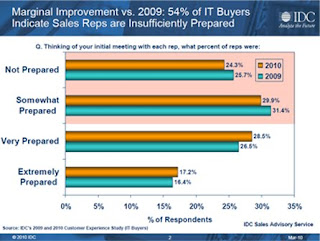Much focus has been given to the topic of sales enablement during the past couple of years by consultants, research firms, marketing and sales automation vendors, and marketing and sales operations teams. Not to mention the associated financial investment that accompanied these efforts. So with all of this attention to the discipline of sales enablement, how much of an impact has it had on sales’ relationships with customers?
First of all, here’s IDC’s definition of sales enablement to ensure that we’re all on the same page:
- “The delivery of the right information to the right person at the right time in the right format and in the right place to assist in moving a specific sales opportunity forward”
As one of many indicators of sales enablement’s progress, IDC tracks IT buyer experience with sales and marketing teams on an annual basis. In early 2009 IDC’s Sales Advisory Service provided the following output from a survey of 200+ IT buyers: IT buyers indicated that over 50% of sales reps are unprepared for their initial customer meetings. (57% to be exact) The same buyers indicated that sales folks need to “put away the generic pitch” and engage in more of dialogue with customers. This is old data and not applicable any longer, right?
IDC recently completed an update of this study. IT buyers now indicate that ~54% of sales reps are unprepared for their initial customer meetings. A marginal improvement over 2009, if you could call it that. “Say It Ain’t So, Joe!” Why hasn’t all of our effort and investment in sales enablement paid off!
Well, bad economy aside, I do see some reasons why we aren’t seeing greater levels of improvement in this study year over year. Here are just a few of those reasons:
- This data is an average across all IT buyers surveyed, and includes IT buyers’ views on many different vendors; many of which have yet to even begin a comprehensive sales enablement initiative. A question for you. . . Are you surveying your specific customers to gauge their level of satisfaction with your sales teams’ knowledge?. . . . And gauging to what extent this impacts revenue, share of wallet, etc? How has this trended over time?
- Sales enablement initiatives are only in the early stages of execution. Many companies are just starting to put the right resources in place to support this effort, from a people, process and technology perspective. (contact me for a copy of a recently published document regarding guidance for a sales enablement organizational framework)
- Sales reps still need to be held accountable for leveraging all of the resources that a company provides to aid in their success. They say that “you can lead a horse to water, but can’t make it drink.” Well, the horse will eventually have to drink the water to survive.
- Sales enablement is not the panacea for all of sales’ productivity challenges. Other key elements for productivity improvements as detailed in IDC’s Sales Productivity Framework include: customer intelligence, sales management, sales methodologies and talent management.
- Let’s refocus our analysis on the customer. Customers are becoming more sophisticated about technology solutions and vendors prior to sales even having that first meeting; and IDC customer experience data proves this statement. Thereby increasing the importance of “Customer Enablement” before, during and after real-time customer engagement. Yes, marketing (corporate, product and field marketing) do matter. . . and more than ever.
Let’s be clear, sales enablement must remain a top priority for your organization in 2010, for sales and marketing. However, sales enablement should only be part of your overall strategy for sales productivity improvement; and development, execution and governance of these initiatives across large, complex organizations takes a lot more than one visionary and some great PowerPoint slides.
Please feel free to comment on this topic below as well as sharing what you’re seeing “in the field”.
Also, our Sales and CMO Advisory teams will be at the upcoming IDC Directions events in Boston, MA and Santa Clara, CA in the next couple of weeks, presenting more insight into how sales and marketing teams can improve their productivity and overall effectiveness. Go to the link above to find the agenda and more details!





